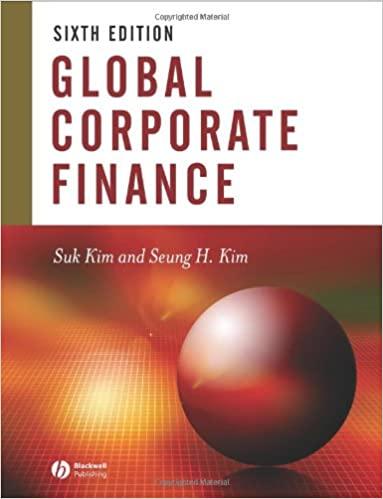Evidence indicates that it has become increasingly difficult to define a national company in recent years. There
Question:
Evidence indicates that it has become increasingly difficult to define a national company in recent years. “There is no longer any such thing as a purely national economy. The rest of the world is just too big to ignore, either as a market or as a competitor. If business schools do nothing other than to train their students to think internationally, they would have accomplished an important task” (John Young, CEO of Hewlett-Packard). “There is no German, French, or American capital market any more. It is a global capital market, and we all have to play by the same rules” (Ulrich Hartmann, CEO of Veba AG). On the one hand, many non-
US companies such as Toyota Motor and BP Amoco are also listed on the New York Stock Exchange. On the other hand, US companies, such as IBM and GM, are listed on most European stock exchanges. A management team from Ford took over Mazda Motor of Japan in 1996. In 1999, capital raised in several countries by Deutsche Bank financed its acquisition of Bankers Trust New York, which had taken over management of overseas clients from Nippon Credit Bank of Japan in 1996.
Companies have pursued international business for many years – in order to expand sales, acquire resources, diversify sources of sales and supplies, and minimize competitive risk.
However, they have recently entered an era of unprecedented worldwide production, distribution, and financing due to several factors: expansion of technology, liberalization of crossborder movements, increased global competition, and the development of supporting institutional arrangements.
In today’s global economy, it is not easy to define “a national company,” especially a US company. In his recent interview with The Wall Street Journal, Edmund Fitzgerald, Chairman of Northern Telecom, said: “My company has its headquarters in Canada, but most of its sales are in the United States. It employs about as many Americans as Canadians. A big chunk of its shares are owned by Americans. Whose company is it anyway?”
In 1993, US government economic officials attempted to prepare papers on the issue and debated it at the National Economic Council. The outcome of these discussions would deeply influence trade and technology policies, ranging from who builds next-generation television sets to US negotiations with Japan. The US government needs a set of guidelines to follow, so that government economic officials can handle such questions as “What is an American company?” and “Whose interests do they advocate?”
When Labor Secretary Robert Reich was an academic, he posed a simple-sounding but fundamental question to US capitalism: “Who is us?” In an age of global business, he asked, do US-owned companies still represent the USA?
Mr Reich argued that American workers should come first, because America’s standard of living depends primarily on improving worker skills. “American” companies are those that provide high-skill jobs for American workers in America – regardless of whether those companies are owned by American, German, or Japanese shareholders. The flag that flies over a factory or corporate headquarters is less and less relevant, he said.
Not at all, responded chief White House economist Laura Tyson, who said that the nationality of a company still largely determines where it will locate the bulk of its sales, production, and research and development. In her paper entitled, “They Are Not Us,” written before either she or Mr Reich joined the government, Tyson argued that “the economic fate of nations is still tied closely to the success of their domestically-based corporations.”
With the globalization of trade, dumping cases can be difficult. Under American law, only US companies are eligible to bring charges. In case law, though not by statute, the firm is considered to be a US company when half or more of a product is made in the USA. A US subsidiary of a Japanese firm, Brother Industries USA, makes portable electric typewriters in the USA. In 1993, it won a dumping case against Smith-Corona, a US company that makes its typewriters in Singapore.
Case Questions 1 What are the reasons for the recent growth in international business?
2 What are the possible definitions of a US company described in the case?
3 Why is it so important to be a US company?
4 Explain how Japanese negotiators have cited Mr Reich’s theories in talks with the USA over opening the Japanese government procurement market to foreign computer makers (see Reich 1990).
5 Can you guess how Mr Reich reacted to the fact that the Bush Administration helped Toys “R” Us Inc. set up stores in Japan? Do you think that President Clinton’s Japan team had the same reaction as Mr Reich’s?
6 How would Mr Reich rank companies owned by Americans and/or with US operations?
7 The website of the White House, www.whitehouse.gov/, gives direct access to US Federal services, a virtual library of the White House press releases, executive orders, and many other pieces of information. Access the above website to answer the following questions:
How and when was the National Economic Council (NEC) created? Who is the current chairman of the NEC? What are the principal functions of the NEC?
Step by Step Answer:

Global Corporate Finance Text And Cases
ISBN: 9781405119900
6th Edition
Authors: Suk H. Kim, Seung H. Kim





